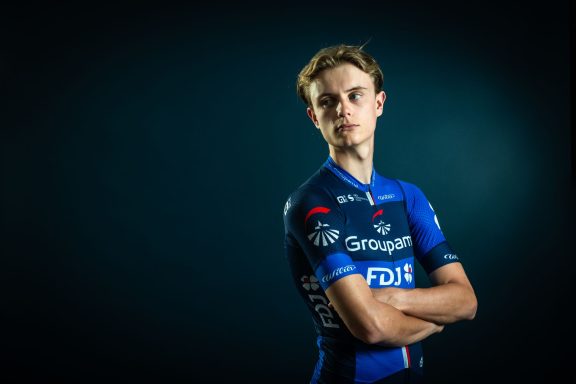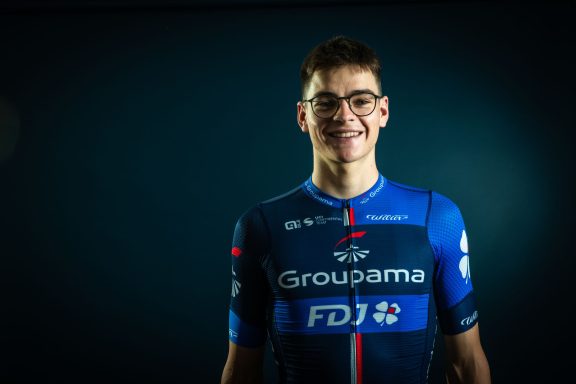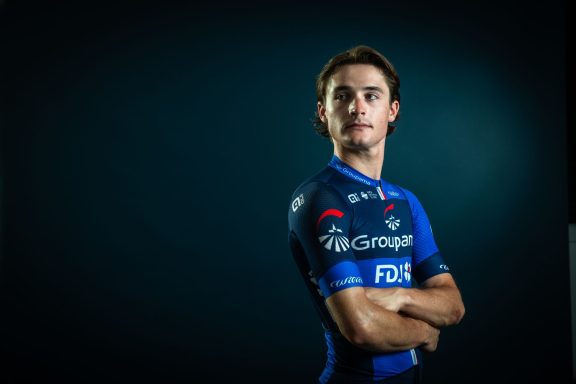Although it ended on a high note on Paris-Tours, Arnaud Démare’s 2021 season was not the quietest. He actually tells everything about it, in depth, in “Une année dans ma roue”, published on November 10 (Talent Éditions). On the occasion of his book release, the three-time French road champion sat down to tell us more about this project, to detail some of the major topics of his story and, doing so, went back on a few highlights of the past year.
Arnaud, how do you experience the media tour for the promotion of your book?
It is totally different from the usual media requests. It also comes at a low period in terms of training and races. I went on holiday, I am still on a break, and I am therefore quite fresh to answer to all these requests. I take it in a much more relaxed way than during the season, when we are usually tired and forced to decline a lot of interviews. My only wish is that people know about the book’s existence, and so that they can get it in case they are interested. It’s been out for a few days and I’ve already received a lot of nice private messages on social media. When people post a story with the book in their hands, I feel a little pride. It’s also rewarding to make people happy by giving them a part of me.
“It’s almost a private diary”
Talking about it, what was your initial purpose with writing this book?
At first, I really didn’t know what I wanted to talk about. At the end of the eight weeks of columns with Mathieu Coureau for Ouest France, we called each other and we wondered if we should stop there. People liked it, I had good feedback, but on the other hand, it also required a lot of commitment. I was a bit unsure at first, but then we said, “let’s go on and we’ll see how it goes.” Eventually, we held on all year long. To be frank, at first I thought I was going to tell something similar to 2020: successes, victories. It was more difficult than I thought. I actually doubted at one point. I told Mathieu, “the book is not going to interest anyone, I am not winning, people won’t care”. On the contrary, he was convinced that we could discover something else, and that rarely had an athlete talked about his doubts so deeply. We decided to keep going and I held on to that. The Tour was coming up, I wanted to storm it all, but it didn’t go as hoped. In the Vuelta, I wanted to show someone who gets up on his feet, someone who comes back and wins, but it did not work either. I had to wait for the very last race of the season. This story eventually shows that it is not always easy. You set yourself goals that you don’t always manage to achieve, but that doesn’t mean you have to stop believing, despite going through big doubts at times.
How much were you willing to open up when you started the book?
It was truly a day-to-day discovery. I didn’t even know Mathieu really. We got closer as time passed by. At the end of this collaboration, we could even say a friendship has formed. To be honest, over time I didn’t even realize I was writing a book anymore. I was just talking to Mathieu, I was giving him an overview of what I was going through. He was able to listen and put into words what I was telling him and what I was feeling. It was only over the months that I realized how much I was opening up. Until the end, I didn’t even really think it was going to be published. Ultimately, it’s almost a private diary.
Didn’t you think that this project could become a burden over the course of a season?
I did, and I thought about it carefully before starting. When we got over the weekly columns, I told Mathieu that I wanted to continue, but not at the same pace, therefore not every week, and probably being a little shorter. Still, I actually liked doing it, I liked taking my time to tell him everything. Although I first thought that it could get constraining, it eventually became a ritual. In the hotel room, rather than watching a movie or a series, I would call him and tell him what I had been through. I did a lot of it during transport times as well, and never took notes. What I was telling him is how I was feeling at the time. When I didn’t have time, I would send him a vocal message to tell him about my day. It was really quick at times, but it was enough for him.
“To show the hidden part of the iceberg”
In the first part of the book, we can see your desire to pay tribute to those who surround you.
That is true, because sometimes we can forget how important these people are to an athlete, and especially to a professional cyclist. For me, it was necessary to shed light on these people, usually in the shadow. I think the general public does not necessarily realize what they go through on a daily basis. The general public sees the race, but my relatives, my wife, Julien [Pinot], see what I do, what I live. These chapters enabled me to talk about my training and preparation, but also to show the hidden part of the iceberg. We don’t usually talk about our loved ones, our work, our doubts, and everything around us. That was a good opportunity to do so.
To illustrate their support, you write about your wife: “calm for me, loneliness for her”.
It was a way of paying tribute to the riders’ partners. When this column was released last winter, Morgane and I had received a lot of messages from wifes who told us: “I see myself there completely”, “that’s so true”, “thank you for sharing this part of our life”. It’s good to talk about it, to say how our partners feel when we leave on the races. Even when we are at home, we are focused on our goals, we try to maximize everything, we do not go to bed late, we eat well. It’s all part of a life rhythm. Then, when we leave, it’s kind of a void. We no longer have this little metronome to pace our daily lives. It’s always difficult to leave, even if we love what we’re doing and that we are happy once we’re in a race. But when you spend more than half the year away from home, you realize it’s not a job like any other.
However, you also say that a “career goes by quickly” and that you would be “ashamed to do things by half”.
I realized early on that I didn’t want to have any regrets regarding my career. As a young neo-pro, I was already thinking about it quite often. It only intensified after my disappointing 2019 season. I felt I had the potential to do better. Even though I was already very professional, I told myself that I could achieve great things by going even further here and there. As a result, 2020 was an extraordinary season. What is a bit paradoxical is that despite a copy/paste in 2021, it did not go the same way at all. The body also has its own pace. This is what I wrote in the book. Until my first break after the Vuelta a Valencia, the body was not reacting the way I wanted it to, I felt it wanted to recover. And indeed, this break did me a lot of good.
“Beyond my own disappointment, it is that of the people around me”
You consider your 2021 season disappointing (9 victories, editor’s note), but you also repeat in the book that one should “never trivialise victory”.
We cannot deny that there is a hierarchy among victories, that some races are more beautiful than others. That being said, the difficulty of winning is always there. At the start of any race, everyone wants to put his arms in the air. At that point, I speak directly to the general public. You sometimes read: “It was a small race.” Yes, but he won. “There was no competition”. Yes, but he won. All this to explain that victory should not be trivialized because it is never granted. Now, I also want to win higher because that’s where I’m expected. If I said, “I’m satisfied with what I did, I’m happy with that, Mayenne was great…” It’s true, Mayenne was great, but I’m expected on the Tour de France. Not only am I expected, but I already succeeded there, I can do it again, and I have to do it again.
For various reasons that you explain in the book, it did not work out on the Tour. In the evening and two days after finishing the stage out of time limit, you use some powerful words….
When I speak, I write, at that moment, it’s mostly an instantaneous picture. I was very disappointed, I was angry with everyone. It’s a day-to-day diary, so it was conceived as we went along. If I had told everything I had experienced at the end of the season, I wouldn’t have told it the same way. I was speaking in the heat of the moment. And it was so in this case as well. More than frustrated, I was extremely disappointed. After all the hard work, everything I, the team, my teammates did, I found myself at home after a week. There were some expectations from the sponsors, the supporters… and I was at home after a week. We were waiting for something to happen and… no, nothing happened. This is even more disappointing. Beyond my own disappointment, there is that of the people around me, the supporters. So yes, words are hard, because those are the words I use that same night. I’m in my room, gutted; I just saw 2-3 months of work vanishing, 2-3 months that led to… nothing at all. Comparatively, in 2017 I raised my arms and wore the green jersey before leaving the Tour. This time, I had done nothing. Words are hard, yes, but these are my words in the heat of things, that’s what I was thinking at the time. It would have been a shame to smooth the rough edges or to tell it three months later. I would have forgotten a lot of things. Words are hard, yes, but that is also undoubtedly what makes the book so deep. This is clearly one of, if not the hardest period of my career. At that point, it had nothing to do with the physical aspect of things. However, to get over it psychologically… People might not realize it, because on TV you just see a bib, a rider, a result, but they forget everything that’s behind it.
“This demanding nature has allowed me to be who I am today”
You also say you don’t pay attention to critics, especially on social media, but don’t you feel being even harsher yourself? We noticed “bad” a lot in the book.
Maybe, I don’t know. Maybe I find people harsh in the way they judge me, or judge riders in general. It’s part of life, of our job, but after having experienced certain disappointments, we no longer pay attention to everything else. I may indeed be demanding too much of myself, but that’s also because of what I’ve already done. This demanding nature has allowed me to be who I am today. Perhaps some riders would be happy with my 2021 season, but it’s not the one I was aiming for. Obviously, I have negative words to describe it, but if I take more perspective, there are also nine victories. That’s good, but far from what I achieved in 2020 in three months of racing. This year, it was bad considering the personal requirements I set for myself. It might be hard, but it’s also what makes me who I am.
You also talk about several debriefings, with your lead-out train, Julien or Marc, which proved to be crucial.
I have always moved forward with honesty and frankness. Being open can only lead to positive things. The debriefings I write about in the book did me a lot of good. I like to know what people think, and when you put it all on the table, you grow from it. I don’t want to spend my time doing it either, but when there’s an issue, when you hold a grudge and that all sides get honest, it will certainly do you good in the long term.
Barely ten lines of your book talk about ketones. Yet this is one of the topics that received the most coverage since its release. Does it bother you?
I have to confess that I didn’t think it would get so big, because that’s really not the subject of my book. That being said, some think it’s a good thing to talk about it. Thibaut also did it in L’Equipe in a recent past. I’m not hiding behind this excuse at all, I don’t see myself as a victim, but it wouldn’t have been honest not to mention it in my diary, even very briefly. We can also be proud of it, as a team and as members of the MPCC. I didn’t make a fuss about it, that’s just how I felt after a disappointment and I don’t regret writing it.
“I have to believe more in myself”
During the Vuelta, you describe the penultimate sprint with these letters: “Pfffff”. At that point, words aren’t enough to explain your frustration?
Indeed, and more especially, I feel like it’s slipping away from me… I feel that it will be complicated to turn things around. I’m hugely frustrated. I try to do things well, but as a sprinter, you also depend on what is going on around you. And nothing was going the way we wanted. I was able to use my good legs at the end of Vuelta by going into breakaways, but that’s also due to the way the course was designed. When we finish on the Champs Elysées, we try to keep as much energy as possible. There was no sprint in the last four days. What could I do? I felt I had the means to have fun, so why not do it? It’s not a victory, but at least I got a small satisfaction out of it. In 2020, I was succeeding every single thing I was trying, without doing too much. In 2021, the door closed in front of me every time even though I wanted it just as much. But I kept giving my best in every race, doing things right and just thinking ‘we’ll see’. That’s the spirit I kept throughout the season.
Up until winning the last race of the year, on Paris-Tours. Still, you explain having experienced a “fear of winning” ahead of the final sprint. Did you ever feel it before that day?
Never. More than the fear of winning, it’s actually the fear of not succeeding. At that point, on the home stretch, I’m really petrified. I say to myself: “you have to succeed, you have to raise your arms, this is an opportunity you haven’t had for 3-4 months, you have to seize it”. On top of that, I knew I was able to beat slower riders. I actually had to do it, I couldn’t miss it.
What moral would you take from this season?
I understood that I could sometimes be a little too harsh on myself, and not realize what I’m capable of doing. The legs are there, but I have to believe more in myself, for example when our train is not in a good position. I had already analysed all of that after the Vuelta, but going through the book made me realize it again.
Are you looking forward to getting started again?
Honestly, Paris-Tours really did me good. It was… essential to finish this way. It allowed me to go on holiday more serenely, and that also was something different than a bunch sprint. That’s what I want to remember and what motivates me as I head into the next year.



No comment